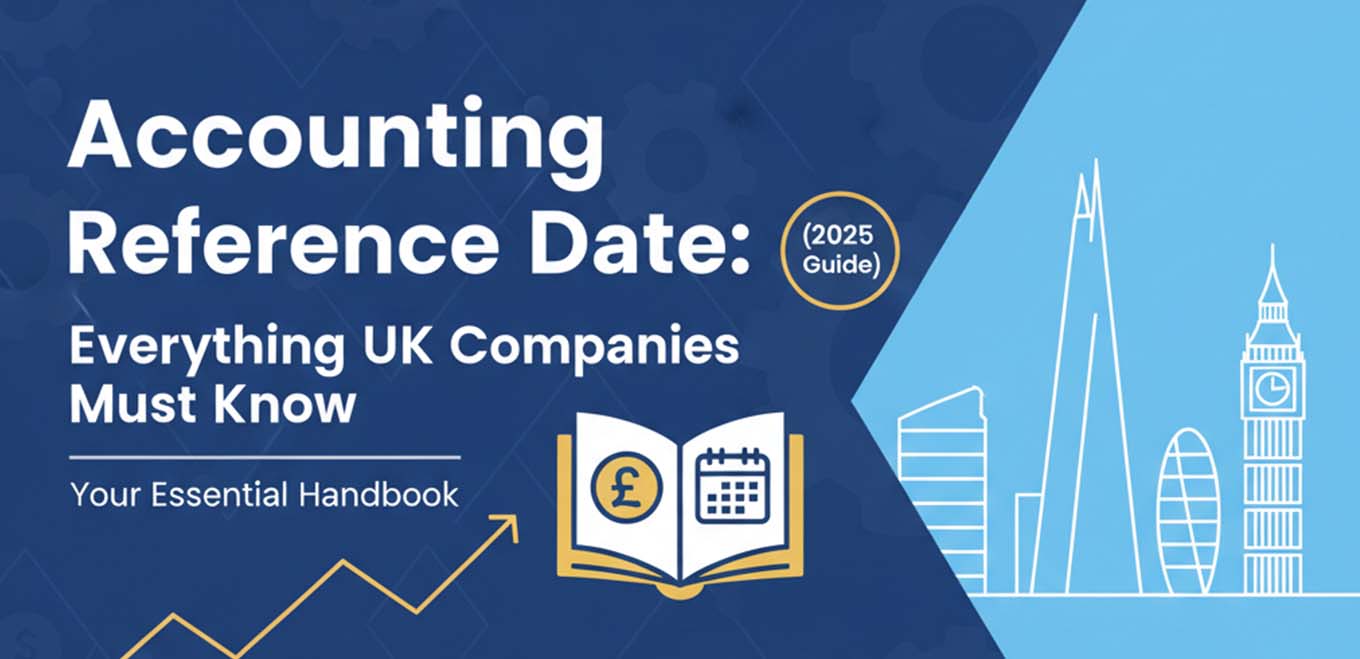- Email: Info@121companyformation.Co.Uk
- Phone: +44 (0)203 8932 121
17 Nov

Introduction
When you form a company in the UK, one of the first and most important dates you’ll encounter is your Accounting Reference Date (ARD). It may seem like a small detail, but this date determines when your company’s financial year ends, when your accounts must be submitted to Companies House, and how your Corporation Tax period is calculated with HMRC.
Many company directors overlook the importance of their ARD until it’s too late — leading to missed filing deadlines, penalties, and administrative headaches. In this detailed guide, we’ll walk you through everything you need to know about the Accounting Reference Date; what it means, how it’s set, how to change it, and how it affects your company’s accounts and tax responsibilities.
What Is an Accounting Reference Date (ARD)?
The Accounting Reference Date (ARD) is the date that marks the end of your company’s financial year. It is used to determine the period your company must prepare annual accounts for submission to Companies House.
For most UK companies, the ARD is automatically set when the company is incorporated. It’s always the last day of the month in which your company was formed.
Example:
If your company was incorporated on 10 April 2024, your accounting reference date will be 30 April. Your first set of company accounts will usually cover the period from 10 April 2024 to 30 April 2025.
The ARD, therefore, defines the accounting reference period, the span of time that your accounts and financial reports will cover.
How the Accounting Reference Date Is Set
When your company is incorporated with Companies House, the system automatically assigns an Accounting Reference Date. This date sets your company’s first financial year end.
For most private limited companies:
- The first accounting period runs from the incorporation date to the first ARD (usually 12 months plus a few extra days).
- Every subsequent accounting period runs from the day after the previous ARD to the next ARD (typically 12 months exactly).
This automatic assignment ensures every company in the UK has a clearly defined financial reporting cycle.
You can view your current ARD by searching for your company on the Companies House register, it will be displayed alongside your incorporation and filing dates.
Understanding the Accounting Reference Period
Your Accounting Reference Period (ARP) refers to the specific timeframe covered by your annual accounts.
- The first ARP may be slightly longer than 12 months (from incorporation to the first ARD).
- Each subsequent ARP covers a full 12 months.
It’s worth noting that the ARP for Companies House (used for annual accounts) can differ slightly from the Corporation Tax accounting period used by HMRC.
Why the Accounting Reference Date Matters
Your ARD isn’t just an administrative date — it has real financial and legal implications. It determines:
- When your annual accounts must be filed with Companies House.
- For the first set of accounts, the deadline is 21 months after incorporation.
- For subsequent years, it’s 9 months after the ARD.
- For the first set of accounts, the deadline is 21 months after incorporation.
- When your Corporation Tax return must be submitted to HMRC.
- Usually 12 months after the accounting period ends.
- When your financial planning and forecasting reset for the next year.
Missing an ARD deadline can lead to:
- Penalties from Companies House
- HMRC fines for late Corporation Tax submissions
- Risk of your company being struck off the register
For this reason, understanding and managing your ARD is essential for every company director.
How to Find Your Company’s Accounting Reference Date
You can easily find your ARD by checking your public record on Companies House.
Steps:
- Go to the Companies House website.
- Search for your company name.
- View your company’s profile — the accounting reference date and next accounts due date will be displayed.
Alternatively, your ARD can also be found on:
- Your Certificate of Incorporation (for newly registered companies)
- Communications or filings prepared by your accountant or formation agent
If you formed your business through 121 Company Formation, your ARD will have been automatically recorded in your company documents.
Changing Your Accounting Reference Date
You may decide to change your ARD for several strategic or administrative reasons, such as:
- Aligning your financial year end with a parent company
- Matching the tax year end (5 April)
- Simplifying group reporting or audit processes
To change your accounting reference date, you must apply to Companies House.
You can do this:
- Online via the change your company’s year end service, or
- By submitting the AA01 form by post.
Rules to keep in mind:
- You can shorten your accounting period as many times as you wish.
- You can extend your accounting period only once every five years (unless there are exceptional circumstances).
- You cannot change your ARD if your accounts are already overdue.
Practical Example: Changing Your ARD
Example 1:
Your company was incorporated on 10 April 2024, making your ARD 30 April.
You want to align your accounts with the tax year ending 5 April.
You can apply to change your ARD from 30 April to 5 April
This will shorten your current accounting period, meaning your next accounts will be due sooner.
Example 2:
A holding company owns several subsidiaries and wants all financial year ends to align for group consolidation.
The subsidiaries may apply to extend their ARD to match the parent company’s ARD, provided this does not breach the five-year extension rule.
Filing Accounts After Changing Your ARD
Once your ARD is changed, Companies House updates your next accounts filing deadline.
- If the period is shortened, your filing deadline moves forward.
- If it’s extended, the deadline moves backward.
However, even if your ARD is extended, the Corporation Tax period may not automatically match the new dates. You might need to file two Corporation Tax returns with HMRC for the transitional period.
To avoid confusion or filing errors, it’s advisable to work with a professional accountant or formation agent such as 121 Company Formation.
How ARD Affects Corporation Tax
While your Companies House ARD determines when your annual accounts are due, your Corporation Tax accounting period (managed by HMRC) runs from the date your business starts trading until the company’s financial year ends. If your company changes its ARD, your HMRC accounting period might be affected.
How to Manage Your ARD Effectively
To ensure compliance and avoid penalties:
- Track your filing deadlines via the Companies House service.
- Set calendar reminders for key accounting and tax deadlines.
- Align your bookkeeping with your ARD for consistent reporting.
- Consult professionals to handle changes or adjustments.
Many company directors also use the annual accounts filing service provided by 121 Company Formation to stay compliant and stress-free.
Key Takeaways for UK Directors
- The Accounting Reference Date (ARD) marks the end of your company’s financial year.
- It determines when your annual accounts and Corporation Tax return are due.
- By default, your ARD falls on the last day of the month your company was incorporated.
- You can change your ARD through Companies House using Form AA01 or online.
- Changing your ARD can help align your financial year with the tax year or your group’s reporting cycle
Take home
Your Accounting Reference Date is a small but powerful part of your company’s compliance foundation. It influences your accounts filing, your Corporation Tax obligations, and your overall financial planning.
By understanding how your ARD works — and adjusting it strategically when necessary — you can keep your business in good standing with Companies House and HMRC.
If you’re unsure about your ARD or need help filing your annual accounts, 121 Company Formation offers expert services to help you manage your company’s compliance from start to finish. We handle everything from company formation to annual accounts filing and confirmation statement submission, ensuring your business remains fully compliant year-round.



